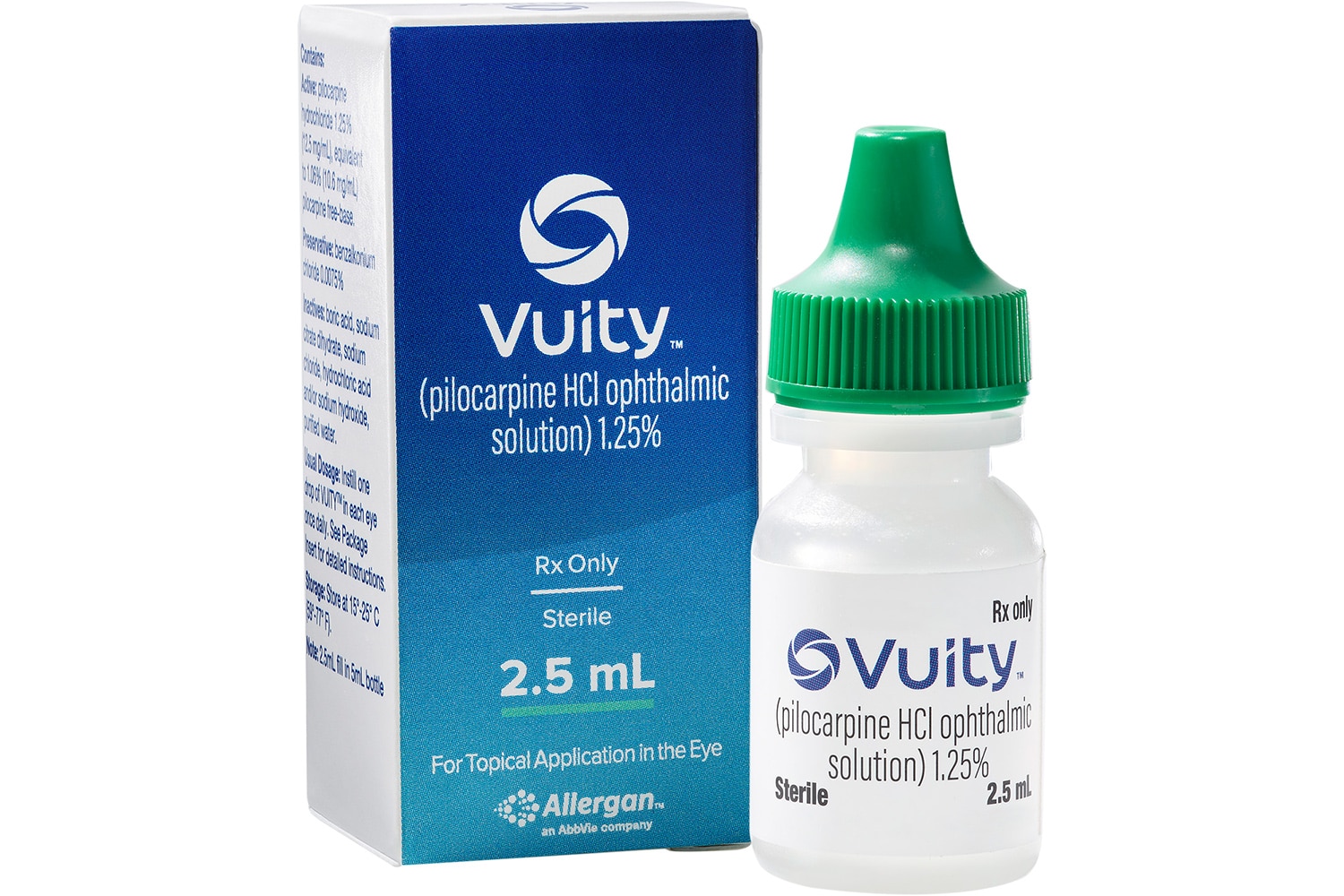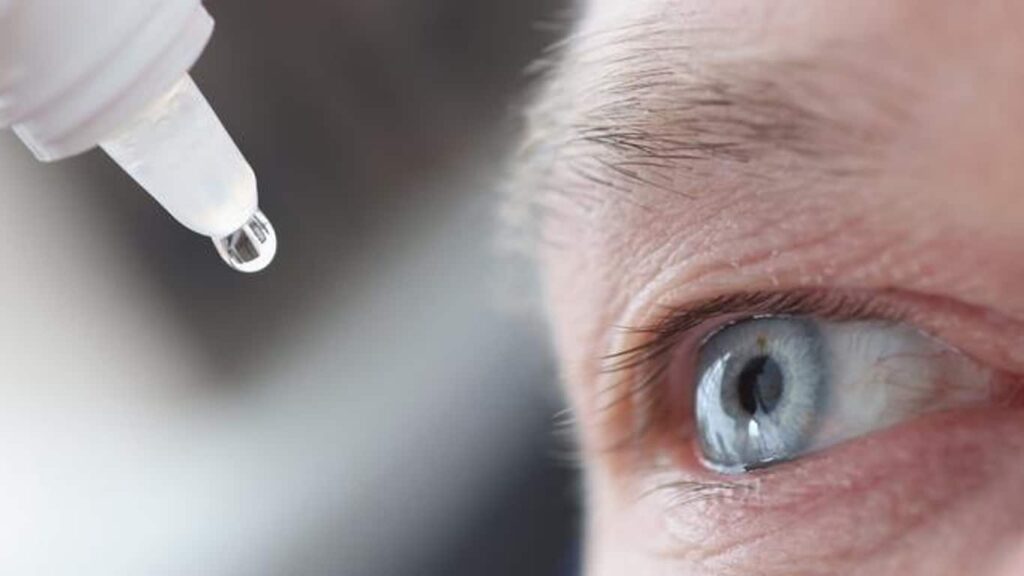Presbyopia, or age-related blurry near vision, is a common and progressive condition that reduces the eye’s ability to focus on near objects, affecting most adults over the age of 45. Recently, Allergan, a subsidiary of AbbVie, announced that the United States Food and Drug Administration (FDA) has approved the use of the first eye drops, named VUITY, that can compensate for presbyopia — without glasses or corrective lenses. Explanations.
Presbyopia affects more than one billion people worldwide. In a non-presbyopic eye, the lens behind the iris (the lens) can easily change shape and focus light onto the retina, allowing clear vision both near and far. In a presbyopic eye, the lens hardens and does not change shape as easily, making it difficult to focus on nearby objects. Presbyopia can be diagnosed by an ophthalmologist or optician. The usual « treatment » is the use of glasses, contact lenses or eye surgery.
In a statement, Michael Severino, President of AbbVie, said: Most adults face presbyopia or near vision difficulties as we age. From around the age of 40, many find themselves using reading glasses, holding text further away, or even increasing the font size and lighting of screens to try to see more clearly. « . This technology could therefore allow many people to compensate for their presbyopia in a much simpler way. But how does it work?
1 drop of eye drops = 6 to 10 hours of action
VUITY is touted as the first FDA-approved treatment for presbyopia. It can be obtained by prescription from an ophthalmologist or an optometrist in American pharmacies. This eye drops is formulated with pilocarpine (a substance already used in the treatment of glaucoma) and uses a technology developed by Allergan to adapt to the pH of the tear film (pHast™). It uses the eye’s own ability to reduce pupil size, improving near and intermediate vision, while maintaining distance vision.

Indeed, it should be known that to produce a clear image, the eyes must adapt to the distance of an object via three stages, if it is close. At first, the eyes point towards the object, then the lens changes shape and the pupils contract. The change in shape of the pupil is carried out by small eye muscles which contract to make the lens thicker (near vision). Indeed, the thicker the lens, the more the light is refracted during its passage. At the same time, the pupils constrict to block some of the incoming light from other objects in the distance. When light bounces off an object and enters the eye, the light rays in the center provide a clear image. Blocking scattered light by constricting the pupil helps sharpen the image of nearby objects.
Jag Dosanjh, Senior Vice President of Medical Therapeutics at Allergan, points out: We are thrilled to be able to bring this treatment, the first of its kind, to market sooner than expected for the millions of presbyopic Americans who could benefit from it. This significant innovation in age-related eye health reflects our commitment to advancing vision care and expands our portfolio of leading treatments for eye care providers and their patients. « .
The VUITY clinical development program
FDA approval of VUITY in October 2021 is based on data from two pivotal Phase 3 clinical studies, GEMINI 1 and GEMINI 2, which evaluated the efficacy, safety, and tolerability of VUITY for the treatment of presbyopia. A total of 750 participants with presbyopia, aged 40 to 55, were randomly assigned to two separate groups, one receiving VUITY, the other receiving a placebo. Participants had to administer one drop of VUITY or placebo once a day in each eye.
The results showed that after 30 days, patients treated with VUITY were able to read at least three additional lines in near vision on a typical reading chart, compared to those treated with placebo. And this, without losing more than one line of distance vision. The eye drops acts in 15 minutes and for a duration of 6 to 10 hours. No serious adverse effects were observed. Allergan mentions 5% non-severe side effects, most commonly headaches and red eyes. The laboratory specifies that these drops should be used with caution when driving at night and practicing dangerous activities in low light conditions.
Presbyopia in the future
VUITY is currently approved for once-daily use. But recently, Allergan announced that the Phase 3 VIRGO trial, evaluating the safety and efficacy of experimental twice-daily administration of VUITY, met its primary efficacy endpoint, improving near vision. without compromising distance vision. The same test protocol was used (two random groups receiving either eye drops or a placebo). Specifically, the researchers found that patients treated with VUITY were able to read at least three additional lines in near vision on the typical reading chart in just 14 days. Additional details of this trial will be presented at future medical meetings and will form the basis of an additional New Drug Application submission for elective twice-daily administration to the U.S. Food and Drug Administration (FDA) in Q2. of 2022.
Christopher Lievens, study participant and professor at the Southern College of Optometry in Memphis, said in a statement: We are encouraged by the results of the VIRGO trial, which suggest that administering VUITY twice daily may provide an additional dosing option for people with presbyopia to improve their near vision without compromising their distance vision. « .
Finally, VUITY is not a miracle treatment, because the effect is only temporary. This eye drops does not really allow us to do without reading glasses or progressive lenses, but it illustrates the trend of current medical research: finding the most comfortable and least invasive treatments possible.

